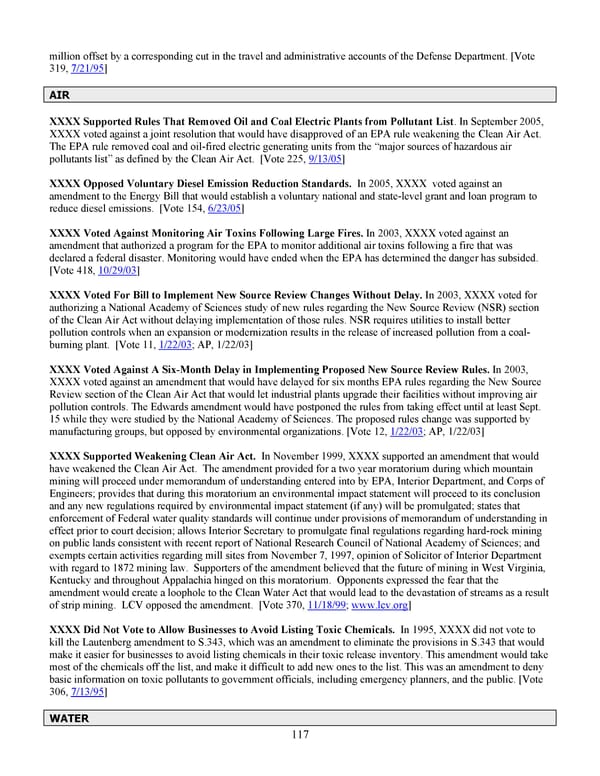million offset by a corresponding cut in the travel and administrative accounts of the Defense Department. [Vote 319, 7/21/95] AIR XXXX Supported Rules That Removed Oil and Coal Electric Plants from Pollutant List. In September 2005, XXXX voted against a joint resolution that would have disapproved of an EPA rule weakening the Clean Air Act. The EPA rule removed coal and oil-fired electric generating units from the “major sources of hazardous air pollutants list” as defined by the Clean Air Act. [Vote 225, 9/13/05] XXXX Opposed Voluntary Diesel Emission Reduction Standards. In 2005, XXXX voted against an amendment to the Energy Bill that would establish a voluntary national and state-level grant and loan program to reduce diesel emissions. [Vote 154, 6/23/05] XXXX Voted Against Monitoring Air Toxins Following Large Fires. In 2003, XXXX voted against an amendment that authorized a program for the EPA to monitor additional air toxins following a fire that was declared a federal disaster. Monitoring would have ended when the EPA has determined the danger has subsided. [Vote 418, 10/29/03] XXXX Voted For Bill to Implement New Source Review Changes Without Delay. In 2003, XXXX voted for authorizing a National Academy of Sciences study of new rules regarding the New Source Review (NSR) section of the Clean Air Act without delaying implementation of those rules. NSR requires utilities to install better pollution controls when an expansion or modernization results in the release of increased pollution from a coal- burning plant. [Vote 11, 1/22/03; AP, 1/22/03] XXXX Voted Against A Six-Month Delay in Implementing Proposed New Source Review Rules. In 2003, XXXX voted against an amendment that would have delayed for six months EPA rules regarding the New Source Review section of the Clean Air Act that would let industrial plants upgrade their facilities without improving air pollution controls. The Edwards amendment would have postponed the rules from taking effect until at least Sept. 15 while they were studied by the National Academy of Sciences. The proposed rules change was supported by manufacturing groups, but opposed by environmental organizations. [Vote 12, 1/22/03; AP, 1/22/03] XXXX Supported Weakening Clean Air Act. In November 1999, XXXX supported an amendment that would have weakened the Clean Air Act. The amendment provided for a two year moratorium during which mountain mining will proceed under memorandum of understanding entered into by EPA, Interior Department, and Corps of Engineers; provides that during this moratorium an environmental impact statement will proceed to its conclusion and any new regulations required by environmental impact statement (if any) will be promulgated; states that enforcement of Federal water quality standards will continue under provisions of memorandum of understanding in effect prior to court decision; allows Interior Secretary to promulgate final regulations regarding hard-rock mining on public lands consistent with recent report of National Research Council of National Academy of Sciences; and exempts certain activities regarding mill sites from November 7, 1997, opinion of Solicitor of Interior Department with regard to 1872 mining law. Supporters of the amendment believed that the future of mining in West Virginia, Kentucky and throughout Appalachia hinged on this moratorium. Opponents expressed the fear that the amendment would create a loophole to the Clean Water Act that would lead to the devastation of streams as a result of strip mining. LCV opposed the amendment. [Vote 370, 11/18/99; www.lcv.org] XXXX Did Not Vote to Allow Businesses to Avoid Listing Toxic Chemicals. In 1995, XXXX did not vote to kill the Lautenberg amendment to S.343, which was an amendment to eliminate the provisions in S.343 that would make it easier for businesses to avoid listing chemicals in their toxic release inventory. This amendment would take most of the chemicals off the list, and make it difficult to add new ones to the list. This was an amendment to deny basic information on toxic pollutants to government officials, including emergency planners, and the public. [Vote 306, 7/13/95] WATER 117
 HRC vote skeleton Page 127 Page 129
HRC vote skeleton Page 127 Page 129